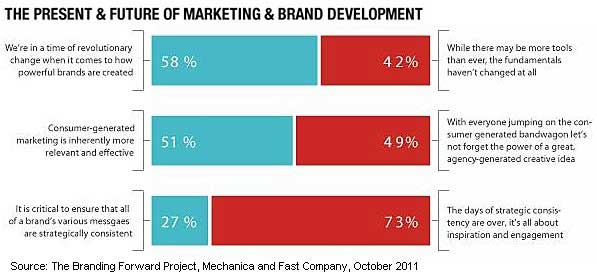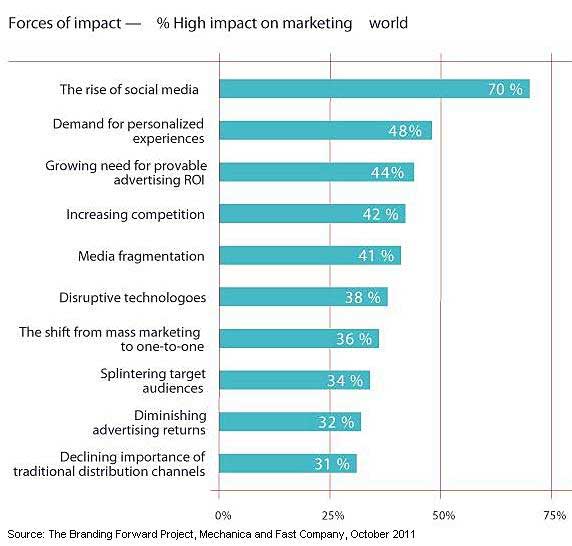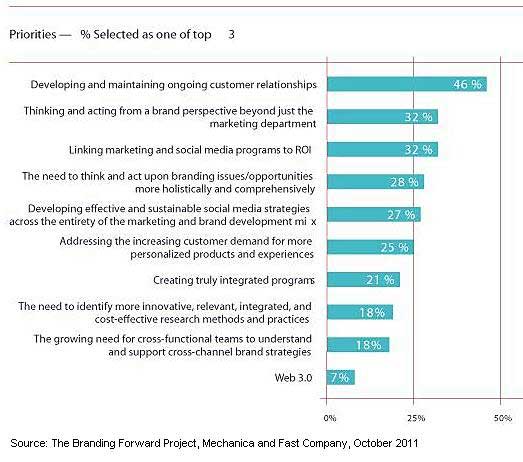Marketing professionals have mixed opinions on the state of branding today: 58% of those surveyed say "we're in a time of revolutionary change when it comes to how powerful brands are created," whereas 42% express the opposite viewpoint, saying "the fundamentals haven't changed at all," according to a report by the Branding Forward Project.
Brand marketers are even more divided about the importance of consumer-generated content: 51% say such content is more relevant and effective than agency-generated ideas, whereas 49% question its superiority over agency content.

However, nearly all (73%) brand marketers agree the days of strong brands being characterized by consistency above all else were indeed over.
Below, additional findings from a survey from the Branding Forward Project, an ongoing collaboration between Mechanica and Fast Company focused on developments in marketing and brand management.
New Forces at Work: Social Media and Personalize Experience
Social media (70%) and the rising demand for personalized experiences (48%) are viewed as the forces having the most significant impact on branding and marketing today, followed by the growing need for provable ROI (44%) and increasing competition (42%).

Media fragmentation (41%), splintering audiences (34%), and diminishing ad returns (32%) are only just beginning to affect marketing, but their impact will likely increase in the future, according to the study.
Forging New Solutions
Asked to identify and prioritize the strategies, methodologies, and tactics being used to respond to the new marketing world, brand marketers cite developing and maintaining ongoing customer relationships (46%); thinking and acting from a brand perspective beyond just the marketing department (32%); and linking marketing and social media programs to ROI (32%).

Roughly one-quarter of brand marketers say addressing new demands for more personalized products and experiences (25%) and a more holistic approach to brand management are priorities now.
Looking ahead, however, brand marketers expect to focus more on both those approaches.
Asked to rank which one factor was having the greatest impact on their long-term strategy, brand marketers cite the following:
- Focusing on the entirety of the user experience: 35%
- Using innovative media thinking: 27%
- Thinking about branding more holistically: 27%
- Improving marketing accountability: 24%
Looking for solid, substantiated information about email from the industry's best resources? The 67-page Email Marketing Factbook featuring 39 charts tells you about email usage, what captures users' attention, and how organizations are using email to reach customers. This email factbook consists of chapters 1 & 2 from the larger Digital Marketing Factbook a 144-page compilation of data and 110 charts that also covers search engine marketing and social media.
Which Tactics Are Generating the Most ROI
Results are still mixed on generating ROI from social media and content-based marketing strategies.
Based on their experiences, few brand marketers say branded apps, location-based mobile services, and social media monitoring have proven successful, while larger percentages report they cannot prove the effectiveness of the channel (i.e., the respondent has no interest in trying or states they have tried the concepts and do not feel like they were effective):
- 44% say branded apps have proven successful; 49% can't prove they were successful; and 7% say they were not successful.
- 40% say location-based mobile services have proven effective; 46% can't prove this; and 14% say they were not successful.
- 43% say social monitoring and sentiment analysis has proven effective; 48% can't prove this; and 9% say they were not effective.
Traditional SEM/SEO programs, analytic dashboards, sales force automation platforms have proven most successful among brand marketers:
- 72% say SEM/SEO programs have proven to be effective; 23% can't prove this; and 5% say such programs have not been effective.
- 63% say analytics dashboards have been effective; 32% can't prove this; and 5% say they have not been effective.
- 57% sales force automation platforms are effective; 27% can't prove their effectiveness; and 16% say such platforms have been unsuccessful.
About the data: Findings are from a survey of 623 marketing professionals who have responsibility for, or influence over their company's marketing and branding decision-making, conducted in 2011. The respondents comprise a high proportion of Fast Company readers and are composed of agency marketers (41%) and in-house marketers (59%). Among in-house marketers, 20% are B2C, 30% are B2B, and 50% market to B2C and B2B.



